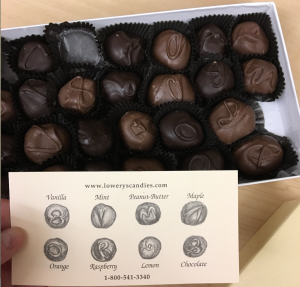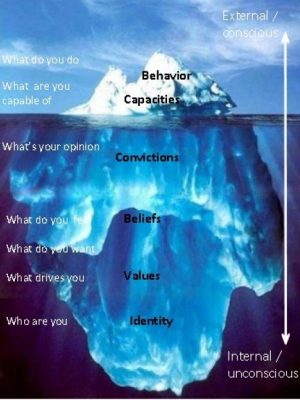Podcast: Play in new window | Download
 What do your emotions and behavior hide?
What do your emotions and behavior hide?
Your behaviors, your feelings and emotions are the tip of the iceberg, hiding the below water part, your attitudes. Your attitude to anything…
Here is the exercise: Close your eyes and imagine a bowl of cherries in front of you. It’s all for you. No competition. Or a box of chocolates if that fits you better.
How do you eat your cherries?
 You reach out and take a cherry, or whatever you have in front of you.
You reach out and take a cherry, or whatever you have in front of you.
- Did you take the largest, most ripe cherry? The best of all the chocolates?
- Did you take the puny little cherry first? The kind of chocolate you don’t really like?
- Did you just take any of the cherries, without looking if it is big, plump, or puny?
The underlying attitude shows clearly on your behavior.
- If you took the largest cherry… you want your results now, not later. If you look deeply enough, you don’t want to work for your rewards either.
- If you took the puniest cherry, then you are planning for the journey: every cherry will taste better than the previous one. And you are probably willing to work for success… and enjoy the work.
- If you just took any of the cherries, then your relationship to life is based on not even seeing the difference. You are probably unaware, and not present.
Now, reading this, I guess, you will want to change your behavior.
 But alas, changing the tip or the iceberg won’t change the depth… the attitude.
But alas, changing the tip or the iceberg won’t change the depth… the attitude.
A student of mine is struggling. She is asking me what to do so she can change her life. What she is unaware of, is that the attitude, deep in the sea, is running the show… That ‘invisible’ she is unwilling to look at.
So let’s look at some attitudes, the bottom of the iceberg, and some emotions that are on the top.
Or alternatively,
let’s look at some emotions, and see what attitudes feed them.
Now, before I get to it, ask the question: why are we doing this? And here is why: You have no control over your emotions. None. But you have a lot more control over your attitudes.
Sidenote: Notice that the most successful, most famous teachers, hypnotists, gurus, are teaching you to change your emotions, or change your behavior… without ever teaching you that what they are teaching is bogus, doesn’t work, but makes them rich, not you.
Of course your control over your attitudes is largely influenced by the number of “intangibles”, the number of DNA capacities you have working. I don’t want to lie to you: there are attitudes that you’ll not be able to change with the number of capacities you now have. But at least you’ll know…
Another sidenote: all emotions, all attitudes are created by words you speak, most likely, in your head. We call that worldview, by the way. The words, unfortunately, are likely invisible for you, invisible like water for the fish, air for the bird. It is mandatory to dig out the words if you EVER want to have a different life.
Frustration AND Anger
The attitudes (words) underneath are:
- There is something wrong with it, wrong with them, wrong with me
- Life should be different than life is (it should be easy, fair, fun, etc.)
- It is not up my job to make it happen.
The essence is: it’s wrong how it is. I am a victim…
Impatience
Attitude (words):
- It should be instant… I should already be there… It should be easy… It is due to me
- You/he/it should be faster than it is
- It should not take work or process to make it happen
- It’s tedious. Boring. Work is a 4-letter word
- I should be somewhere else doing something better
Anxiety
Attitude (words)
- I don’t want to deal with this
- Why do I have to do this?!
- Where am I going? What is going to happen?
- I don’t matter. What I do doesn’t make a difference
- No matter what I do I always end up…
- I can’t handle it
The attitude of unwillingness to be present. Why? The present may be unpleasant. So the attitude is: one-day, someday… but because the future doesn’t exist, and the future is built on the action you are taking today, the future is both uncertain, and certain: more of the same… or worse.So, we can sum up the attitude: I don’t matter, what I do don’t matter, I am a victim.And another aspect of this attitude: whatever is coming: I can’t handle it. If you have attempted to activate self-trust, you see that lack of self-trust is about 50-70% of the anxiety.
Offended
Attitude (words)
- They did it to me
- The don’t respect me
- I deserve better
OK, I can’t think of more emotions right now. But let’s see what cherry you picked and what else I can about where your life is heading.
What I teach is that the path to happiness, success, health, love, fulfillment is the strait and narrow method, the Anna Karenina Principle.
The person who adheres to this method will demonstrate it even with the simple way they eat a bowl of cherries.
They will leave the best to last.
It’s all about the contrast.
If you eat the best first, the next cherry, in contrast, will be a disappointment… and you’ll experience of unhappiness. Not yet.
Not kidding.
The person who adheres to the Anna Karenina Principle, on the other hand, has a hopeful and altogether happier life experience, because they always look forward to better, more, bigger, tastier, or when it comes to success, to the rewards, instead of just work work work.
The opposite, the one who takes the biggest cherry, on the other hand suffers, and either gives up, or mucks up… I have students like that…
In life instead of eating cherry, we deal with life, and tasks. This group has big aspirations, big plans, and puny results. Because the big cherry, in this context, is the imagined end result… and everything pales in comparison.
Can this person change their attitude? Chances are even if they could they won’t. They like the rush of the dream, they are addicted to it. Like opioid addicts.
 I remember some 45 years ago a doctor treated my depression with opioids, without telling me.
I remember some 45 years ago a doctor treated my depression with opioids, without telling me.
I had my appointment, daily, at 10 am.
On the third day, at 9:30 in the morning I started to perk up… Suddenly there was a spring in my step as I descended from the sixth floor. The doctor’s office was on ground floor. I had to cross the parking lot… It was a beautiful sunny day. I had the box of injections in my hand. In the sunlight I could read the tiny letters… Opioid.
I carefully put the box on the pavement and jumped on it with both feet. Hell no! I said, and it was done.
I still, occasionally, have visions of something heavenly, like a cup of tea in the morning… or imagining what it will feel like when I can run again with the wind in my hair.
But, because I am an Anna Karenina Principle person, I know if it is to be it is up to me… So I exercise every day, so one day I can run again. It hurts, like eating a puny cherry, but it takes me closer to the best cherry.
Want to share your most dominant emotions?
Want to help me out? Please post your suggestion in the comments below. No emails on this one.
The comment must be organized like this:
1. the emotion or behavior (mine or someone else’s) is this:
2. the attitude it covers, the Words. Don’t try the find the name of the attitude… find the words that express it. Like I did in above.
Let’s see if you can follow instructions.
If you can’t or won’t follow instructions… it covers up the attitude of arrogance… that you know better.
PS: Imagine that the box of chocolate is all yours. That you eat them all… Which one do you take first? Now imagine that the box is going around, someone else offers you a chocolate of hers… and everyone in the room. Which one will you take?
Or imagine that you finished your meal, but your partner is still eating. She offers you a bite… what do you take from her plate? The best piece? A piece of potato or a piece of meat?
 To be able to EVER take control of your attitude, you need to be able to hear what you are saying. The little voice that you recognize as yourself, or guidance, or whatever idea you have about it. You need to know it intimately, and dis-identify with it…
To be able to EVER take control of your attitude, you need to be able to hear what you are saying. The little voice that you recognize as yourself, or guidance, or whatever idea you have about it. You need to know it intimately, and dis-identify with it…
I call this the Amish Horse Training Method. Learn to disidentify with the small and destructive voice in your head
 Get the Amish Horse Training method
Get the Amish Horse Training method
this is a very good question.
changing the words is imprecise speaking, even if I said so… it is always owning what is there, automatically, and owning it makes it disappear. When you end up in nothing, aka silence, then you can create, invent something that i in line with what you can commit to. And then the new words give you the beingness that creates the actions and that creates your results.
if you simply change the little voice, then you didn’t do anything: the more something changes the more it remains the same.
I have created my principles already, so I can just simple chuckle at what the voice says… and ignore it like a noisy chatterbox child.
Hey Sophie, I’m looking for what I am missing. I was reading through this thread again, and I’m wondering when you wrote: “Change the words and the behavior changes..,” does that mean when you dis-identify with the voice (which I’m assuming you say: that is not me) the words change to some other words? Or perhaps, is it the relationship to the words that changes when you dis-identify?
One more thing, from where you are now, what is your relationship to the voice like?
Yes. if you look carefully, the words CAUSE the behavior, not the other way around. Change the words and the behavior changes on its own accord
Dominant emotions: Frustration and Resignation
Frustration- This shouldn’t be so hard. Why is this not easier for me. I’m supposed to be good at this by now.
Resignation- I must be a fuck up. Look at your siblings and look at what you have. All of this time has gone by and I have nothing to show for it. You always lose at life.
Yes, I think you’re right. Perhaps I have learned that self criticism is good, and I might be over doing it. Almost everyday, when I go to sleep, I say to myself that I want to be a better person tomorrow. A really good person.
Haha…I hope to learn from you and eventually overcome this. When written out like this and observed as a third person, it feels okay and might even be funny. However, when I was in the thick of it, and got sucked into the anger, it might cause much unintended damage that I want to alleviate.
You see, Christianity decided that even your thoughts are sin. This is how the religion created misery and suppression.
Getting angry is normal, having the thoughts of killing is normal, albeit not pleasant.
Practice allowing anger when you feel it… practice when the object of your anger is not there. Allow it and watch it disappear.
Also, try to separate your anger and others’ anger… it feels just like yours, and then the mind tries to justify it.
Some of the anger you feel is not yours.
Of course. that is what makes it funny. the dichotomy: angry-wanting to annihilate vs. angry-not wanting to hurt
I think the whole thing is hinging on you wanting to do the right thing and not wanting to be angry… suppression.
I might be wrong, but there is something about you wanting to be proper, and nice, and good… and it is killing you.
I laughed as I was reading this. Very funny. I used to be like this.
The emotion or behavior (mine) is this: Anger (caused by Person A, but
can be lashed out at many other people)
Attitude that it covers:
1. Person A is stupid
2. I am smarter than Person A
3. Why can’t Person A do things the way I do things?
4. Why do I need to have Person A around me and affecting me?
5. I need to get rid of Person A.
6. Person A is to be blamed for my anger, especially if I’m lashing
out at other innocent people.
7. I have a reason to be angry, and I am justified.
8. The other people I lash out my anger towards should agree with me
that Person A is stupid, and that I have the right to be angry.
9. The other people should also see how stupid Person A is, and
probably do something about Person A, so that Person A does not do
stupid things to provoke my anger.
Exactly.
Immobilizing yourself so that you cannot be accused of doing any wrong, but never living a life of purpose or getting into the game.
Emotion: fear
Underlying attitude:
Not living in the present/want to control the outcome/child-like behavior-I won’t participate if things don’t go my way
I can’t control the outcome so I can’t participate so I become the victim
Yes, there is a feeling of impending doom and emptyness. I will be found out that I’m not who I’ve pretended to be and my life will fall apart.
self-sabotage. We are intending to manage that.
Emotion is fear and it’s my emotion.
The attitude it covers up is: what will happen when I look deep inside, what will I see?
The emotion or behavior is avoidance or inaction; passively waiting for my mood to change. That I don’t belong, and nothing matters anyway.
The attitude it covers is worthlessness, inadequacy. But it also covers the attitude of superiority: that I don’t need to work at anything, that I will be brilliant once I wake up, obviating the need for regular hard work and dedication, and that there is still time for that to happen.
so let me get this straight: emotion: fear of becoming a victim
attitude: I will be a victim to avoid becoming a victim.
am I getting this right? the controlling the outcome is just smoke screen.
yes, that is the feeling. The truth though that until you see that you won’t be able to do other than flail for the rest of your life.
You need to hit bottom, girl friend, if you ever want to get a life.
Thank you Sophie, I will
It is not complete… the attitude is that when I look inside I probably see how I feel: empty, worthless aka not worth a damn. The attitude of impending doom
OK, it is becoming clear that the distinctions emotion and attitude are not told apart.
So, the emotion is the mood you have been wishing to change.
All the rest is attitude.
The distinction attitude IS worthless, thughh it could also be the feeling
so is with inadequacy.
but what is the attitude that causes one to not have to work hard regularly, have no dedication, and to wait? What is the beingness?
Is it that it is supposed to come to you?
That if you are so brilliant there is no need to do anything regularly?
Or is it: I am afraid to find out that I am not brilliant at all. That I am empty, and not worth a damn?
The emotion or behavior is resignation.
Question: What attitude does it cover? I’m stupid, and I’m a victim.
Emotion is anxiety (fear of unpredictable) and it is mine
And it covers the attitude “I won’t be able to handle it”
Not smart, no growth.
resignation is an attitude.
stupid is also an attitude.
yes. self-trust turned off during the holidays. Let me turn it on for you again. It’s on now. Please use it.
A Behaviour that is mine:- I”ll get to it later
.Avoid it till the deadline
.Do it in a hurry
. Think I have an idea and wing it
Attitude ; Hapless, Underachiever
Ok. Thank you. I will go over his videos.
but pretending to be smart… to avoid hitting bottom, facing the tiger, having to be responsible for anything.
Emotion: hopeless
Attitude underlying :
-unwilling to experiment new things
-something is wrong with what I’ve got
-want to get reward without work
-afraid of failure
This is too good, T.
The underlying attitude, is the same attitude that made you make this post: “I need to be seen as smart.”
The actual behavior is doing shabby work, not in time, not complete and thorough, just going through the motions.
What do you end up feeling?
I wouldn’t make any of your choices. I would look for the one that looked most ripe. If you couldn’t touch the cherries I would rely on color. Color says a lot about a cherry. Color says a lot about a lot of things.
Anonymous, if you go the 67 steps, session, I think 8, talks about learned helplessness. This is what it seems you find yourself in.
You completely missed the purpose of the article. But regardless: you belong to the first group. And your attitude is: If you took the largest cherry… you want your results now, not later. If you look deeply enough, you don’t want to work for your rewards either.
So much true, that you didn’t even read the article… you wanted me to know two things: 1. that I am wrong/stupid/ignorant 2. that you know better. And your results follow.